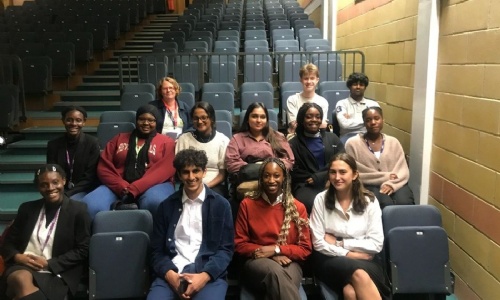Inter-school Economics Competition
Spectacular results from our Economics students

Our Year 12 economists emerged victorious!
On Wednesday 29th June, a group of Year 12 Economists, accompanied by Dr Koestlé-Cate, Head of Economics, emerged victorious at the Inter School Economics Competition at Haberdashers Aske’s Girls School!
After what was nothing short of a thrilling afternoon, the Latymer School, led by Ebiso and Ella, delivered a robust and dynamic argument in favour of deportation of immigrants to Rwanda, cementing themselves as key players within the debate. Our students fully embraced the spirit of debating competitions, where you don’t choose the subject and are told which side of the debate you need to argument in favour of.
Massive congratulations to the whole team: Alex, Azeemat, Catherine, Corrine, Ebiso, Ella, Emma, Hassan, Krishna, Saanvi and Satwick!
Here Catherine, one of the students taking part, tells us more about this fantastic event.
The afternoon came with an inspirational and stimulating start as teams from various schools received an invaluable opening talk from Katrine Marçal, renowned female economist and journalist, who spoke avidly about her experience as a woman in the world of economics. As well as gaining insightful knowledge, we were given a rare opportunity to ask complex questions on topics ranging from Brexit and the monetary policy of the Bank of England to inequalities in the labour market and women in the economy. Our very own Krishna offered fascinating questions about financial independence for women in households and societal preference for men, and how these socio-economic factors could impact the economy and women's role in the economy.
The debate put forward by my fellow students Ebiso and Ella was nothing short of spectacular! The topic, which was on “The best way for the UK to deal with the refugee crisis is to export migrants to Rwanda”, brought compelling arguments on both sides. Perhaps what was most notable about this debate was the presence of both economic, ethical and political arguments that permeated throughout. The winning factor for our team was not only the emphasis on the economic strain this would put both in terms of resultant frictional unemployment, skills shortage of migrants and limited job sector vacancies, but a dismissal of these preconceived arguments about the UK being a “pillar of democracy” or “deportation being unethical.”
In that sense, economics stands as a good factor in making government decisions because it reflects the impacts it will have on society as a whole in terms of employment, labour market etc. as opposed to simply reflecting on the aforementioned ideas or notion. Economics offer a more comprehensive assessment of the topic and the impact on the wider economy which also has an impact on the labour market, workers, and living standards. Whilst there were good arguments put forward by the other team, this debate was a shining example of our school’s fantastic debate skills highlighted the role economics plays in many real-world matters.
The presentation offered by St George’s School reignited familiar arguments about the state and nature of the economy. The question on whether “sustainable growth is only possible with an enlarged role for the public sector” linked nicely, with long-standing economic debates between Libertarian Free Market Thinkers who would argue against an enlarged role for the state, and Keynesian Economic Thinkers, who would argue for an enlarged role of the state. Both arguments have their distinct merits and failures, but were key considerations to be made in the debate and allowed room for the application of these ideas in real life context such as the Covid 19 and the role state planning had in crisis and sustainable economic growth.
The second presentation was certainly by far the most amusing of all the debates. The question, which focused on “the second machine age and how technological developments can make society more inclusive”, was at first glance nothing to do with economics! However I was pleasantly surprised with what was being discussed. With arguments about mobile banking, microfinance loan repayments, digital transfer scheme, working from home and virtualisation of work, the debaters were able to draw connections between greater social inclusivity of the workforce, facilitated by technology and the makings of a more efficient and robust economy, which would ideally balance the use of physical and human capital to achieve inclusivity and economic growth. In the same vein, the counterarguments about excessive reliance on physical capital over human capital, loss of jobs, social media radicalisation and the diminishment of social capital caused by anti-social behaviour, made for a comprehensive debate with a diverse range of points which linked economics to social factors of our society.
Given the broad and diverse range of topics explored, the conference set the stage for a progressive mindset of economic thinking away from the textbook and encouraged us to a take a wider interdisciplinary approach towards economics, using it to inform social and political problems and apply concepts and theories into real world contexts.
